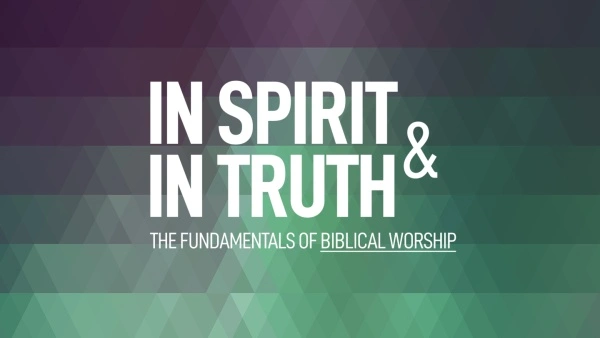Search
Worship
201 Results


5 Things We Do in Worship
There are 5 things found in the New Testament that God will accept as true worship to Him.
Regular Worship
Let's look at the bigger picture that God has designed for New Testament worship.


How Should We Worship God?
In discussing worship, there exists a tension between progressive believers who seek a modern expression of worship and traditionalists who believe in preserving established methods, while many in the middle simply desire to express their love for God in a sincere and communal way, emphasizing that true worship transcends worldly norms and is fundamentally about honoring God.

Why Does the Church of Christ Sing?
This lesson will review the biblical foundation and historical record that establish vocal singing as the Spirit ordained manner of musical praise in public worship.

Miracle Grow
To achieve church growth, one must commit to biblical preaching, evangelism, regular worship, loving fellowship, and sacrificial service, as outlined in this insightful sermon.







What You Should 'Get' Out of Worship
In this sermon, Mike challenges the common attitude of assessing church attendance based on personal gain, arguing that church life should involve both giving and receiving; specifically, attendees should experience a genuine sense of God's presence during worship, beyond mere obligation or habit.



The Good Steward
Stephen Black, a former homosexual, courageously stood up against proposed laws discriminating against homosexuals, sharing his faith in Jesus Christ and the power of change, inspiring others to stand firm in their beliefs.








Growing Pains
Mike shares his journey of growth, from gaining weight to building a church, emphasizing the principle of "no growth without pain" in various aspects of life, urging the congregation to embrace challenges for future opportunities.
The Half-Full Church
The importance of maintaining a positive perspective and fostering a sense of unity and love within the church community is highlighted in this insightful reflection on the power of faith and growth within the congregation.



Summer Sun or Son
Emphasizing the importance of maintaining faithfulness and spiritual growth amidst the allure of sunny weather and outdoor activities, this excerpt encourages readers to reflect on their priorities and commitment to serving the Son of God.
The Dream Church
The ideal church, as described in the New Testament, is characterized by a single leader, Jesus Christ, a unified body, a commitment to holiness, a mission to preach the gospel, and a systematic approach to fulfilling this mission, inviting individuals to reflect on their role in becoming part of this dream church.


Christian Worship in 150 AD
Justin Martyr was a Samarian Christian who lived in the second century. He was a Platonist philosopher who was converted to Christianity and became a strong defender of the faith. In one of his works, "Apology of the Christian Religion", written in around 150AD, he describes a typical Christian worship service of that day.









Why We Struggle
The sermon emphasizes the importance of repentance and spiritual growth within the congregation, urging members to prioritize Bible reading, church involvement, and submission to leadership to overcome struggles and move forward.
What Will it Take
Hezekiah, the king of Judah, provides a valuable lesson on the importance of sanctified leadership in achieving ambitious construction projects and building a strong community.

What Would We be Doing
A sermon reflecting on the potential for greater works in the church, urging for visionary leadership, commitment, and willingness to pay the price to achieve what could be done.





Realizing the Vision
In 1997, the church in Choctaw focuses on personal salvation and readiness for Christ's return, encouraging each individual to be a regular Bible reader and actively participate in church activities to maintain unity and spiritual growth.


3. How to Broadcast your Church Worship Services Live Online
A comprehensive guide to streaming video in your church building. In this guide, we cover everything from microphones to the most important item: patience.










The 5 Chairs
This lesson discusses five different stages of faith represented by chairs, illustrating how believers move through various levels of spiritual maturity. Each chair signifies a distinct relationship with God, from those who are seeking Him to those who are fully committed. This framework encourages reflection on one's spiritual journey and the steps needed for growth.
Hebrews 9:27-28
Difficult Decisions
Reflecting on the recent events in the congregation, the sermon delivered by the church leader emphasizes the importance of following biblical teachings and supporting the decisions made by the elders, urging individuals to make difficult decisions and move forward in unity.



To Proclaim and Serve
A meaningful sermon emphasizing the importance of projecting a positive church image to the community and working towards being a caring and welcoming congregation.
Sure or Unsure?
When feeling unsure about your faith, it's comforting to know that even great men like Elijah and David experienced doubt, as highlighted in this insightful message on navigating uncertainty in Christianity.
A Welcome Mat Church
A church leader emphasizes the importance of personal invitations in church growth, highlighting the impact of one-on-one interactions over grand initiatives or facilities in fostering a welcoming environment for visitors and members alike.
Tongues Today - #2
Mike examines the modern practice of speaking in tongues in light of biblical teaching. He explains the original purpose of tongues in the early church and discusses how its use today differs from the New Testament pattern. The lesson invites viewers to consider whether tongues are still relevant or necessary in contemporary Christian worship.
Tongues Today - #1
This first lesson of two, delves into the biblical context of speaking in tongues, focusing on its significance in the early church. It examines the purpose of tongues as a spiritual gift and the conditions surrounding its use. The discussion aims to clarify misunderstandings about tongues, providing a foundation for evaluating its practice in contemporary worship settings.







What to Expect
Expect the new preacher to work hard as an evangelist, reaching out to the lost, organizing the church, and ministering through God's word, while he expects obedience and involvement from you to foster spiritual and numerical growth and be a model of encouragement to others.
Characteristics of Church
The importance of following the pattern theology for church growth is highlighted through the three pillars of preaching the gospel, teaching Christ's commands, and fostering a fellowship among believers, as discussed in Acts chapter 2.
Brown Bag Christmas
Mike reflects on the Christmas season's approach, noting its lack of biblical endorsement, its pagan origins, and how various customs associated with Christmas have been reinterpreted to hold Christian significance, emphasizing the need to prepare spiritually for the holiday despite its historical complexities.
Salted Speech
Paul's remarkable ability to preach and teach new believers, hostile Jews, and pagans is highlighted in the study of his life and work, emphasizing the importance of salted speech in effectively communicating faith, as seen in his interactions with the Thessalonians.
I Thessalonians 2:1-12
My Most Dangerous Sermon
This sermon looks at the reasons why the "money" sermon is dangerous for the preacher to preach but so necessary for the church to hear.
Moses' Final Instructions
Moses' final instructions to the Israelites in the book of Deuteronomy emphasize obedience to God's word as the key to maintaining God's blessings, urging them not to compromise His commandments while preparing to enter the Promised Land.
1. The Use of Media in Ministry
Communicating the Message
Media is the vehicle for communication and we as Christians are really in the business of communication.



















The Benefits of Worshipping God
Understanding the purpose and benefits of worship in the life of a believer is essential to deepening knowledge of God and experiencing joy in His presence.




Too Full to Fast... Too Fast to Pray
Fasting used to be part of the regular spiritual exercises of the early church. They fasted as part of their ministry of worship to the Lord.

The Modern Church
It seems that there are three elements that help identify the "modern" church. One is a focus on music in worship. Orchestras, choirs, even drama with music are a must if a church is to appeal to today's church goer.

Every Excuse Works
Prioritizing spiritual growth over excuses like "I don't feel like it" or "I'm too tired" can lead to a fulfilling worship experience and a deeper connection with God.
Intensity vs. Accuracy
Reflect on the importance of accuracy in religion as highlighted in the prophetic words of Isaiah regarding the Moabite nation's futile intense religious rituals, emphasizing the need for biblical accuracy over mere intensity in worship and faith practices.















The Light of Choctaw
The text emphasizes the importance of shining as a light in the darkness, just as Moses instructed the people to do, showcasing obedience to God's word as a means to elevate and set apart believers from the pagan world, ultimately leading to the arrival of Jesus Christ as the brightest light.
Not Ashamed
This lesson is based on Romans 1:16 and promotes the notion that the church needs to rediscover the manner and core message of the gospel in order to have a true impact on today's world.
Romans 1:16
Foundations of our Faith
The Church of Christ distinguishes itself by its commitment to following the Bible as the sole authority, emphasizing restorationism and biblical accuracy in its approach to Christianity.
Repentance is a Revolution
Bible Basics
Mike explains how true repentance goes beyond feeling sorrow for sins—it's about a complete transformation of heart and lifestyle. He emphasizes that repentance is a bold, revolutionary act that turns one's life toward God, creating lasting change. This lesson challenges believers to rethink their understanding of repentance and embrace it as a powerful force for spiritual growth.
Acts 2:38
Adultery in the 90's
Mike argues that society increasingly tolerates adultery and moral relativism, moving away from objective biblical values and risking societal decline as a result.
Evangelizing the Postmodern Generation
We are all called to follow Christ in every generation. It is the responsibility of one generation to teach and evangelize the next generation to carry on the mission.
It's Our Turn
Discover the transformative role awaiting each of us as we take on the responsibility to live and share the message of faith for future generations.























The Promise Land
A lesson that parallels an immigrant's experience with the experience of Christians who come into the kingdom and seek the promise of heaven.
A New Vision of the Church
Experience the big picture of building the spiritual temple of God within the church and understand how each individual plays a vital role in creating a community of believers destined for eternity.
Small Beginnings
Zechariah, the prophet, encourages Zerubbabel with prophecies from the Lord during the rebuilding of the temple, highlighting the importance of relying on God's strength and resources rather than man's power, a message that resonates with overcoming obstacles in our own lives.
Zechariah 4:1-10
The Counterfeit Church
Understanding the dangers of cults and the importance of discernment in faith is crucial to protecting oneself from deceptive teachings and false leaders.
Proverbs 14:15
Why Some Won't Make It
The text discusses the Christian belief in heaven and hell, emphasizing the importance of faith and the consequences of disbelief, urging readers to consider their own beliefs and choices.
The Cost of Church Growth
Mike emphasizes the importance of personal sacrifice for growth and invites the audience to reflect on the sacrifices made by past members, urging them to consider the cost of growth at various levels within the congregation.
Soul Saving Speech
Learn from the insightful words of Paul in I Thessalonians 2 on the importance of speaking confidently, honestly, lovingly, patiently, and authoritatively when sharing the gospel to win souls for Christ.
I Thessalonians 2:1-12
Pro's and Con's of Promise Keepers
A group called Promise Keepers is discussed, highlighting both positive and negative aspects of the movement, urging individuals to examine teachings in light of Scripture and consider the importance of staying true to biblical principles.
If Your Brother Sins Against You
Learn how to effectively resolve conflicts and reconcile with others by following Jesus' teachings on forgiveness and reconciliation.
Matthew 18:15-35
Evangelism is Job #1
In this sermon, Mike emphasizes that evangelism is the primary mission of the church, citing Jesus' initial directive to spread the gospel as foundational to all other church ministries, which only become relevant after successful evangelistic efforts have begun.
The New You
In I Corinthians 6 Paul talks about a radical change that is possible and permanent and describes the three steps that lead to this new you.
I Corinthians 6:9-11
The Chosen Wives
In selecting deacons, Paul emphasizes that their wives should possess qualities that support their husband's role, as their character can significantly impact his ability to serve effectively in the church, aligning with the biblical ideal of mutual partnership outlined in Genesis.
























